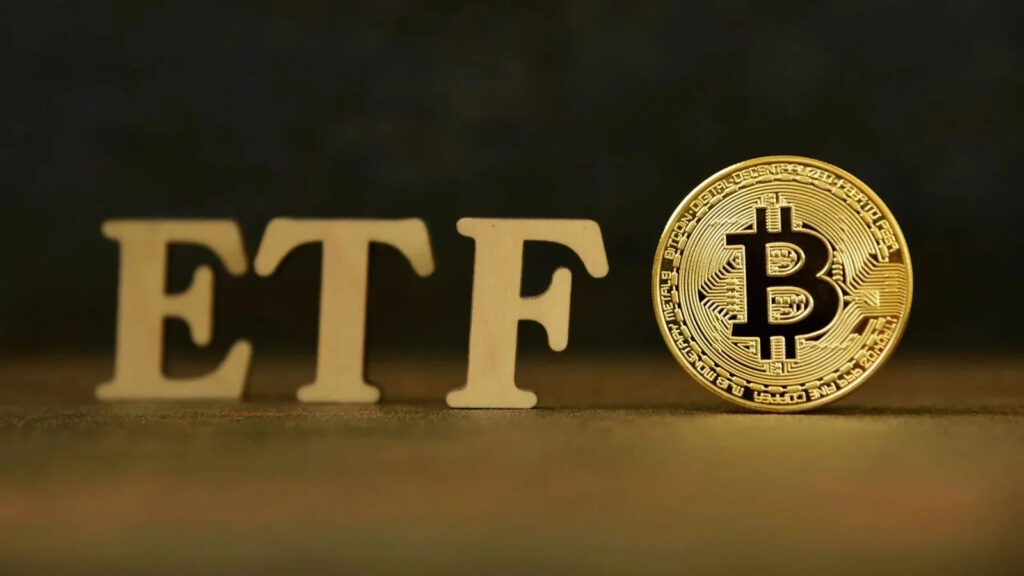I’m sure you opened this because of the recent Bitcoin ETF filling trend and how many big financial firms are filling applications for a Bitcoin spot exchange-traded fund (ETF). For instance, the world’s largest asset management company, BlackRock, amongst other financial firms, has shown interest in the cryptocurrency sector by applying for a Bitcoin spot exchange-traded fund (ETF). While it presents a bullish sentiment for Bitcoin, other analysts see the movement as a red flag. Anyways, let’s paddle the boat.
What is Bitcoin ETF in Layman’s Terms?
Bitcoin ETF is a financial product that allows you to benefit from Bitcoin’s price movement without you investing in Bitcoin.

This means that if you purchase Bitcoin ETFs, you are buying shares of the fund that uses Bitcoin as its underlying asset. Here, the value of the ETF reflects Bitcoin’s performance, giving investors an indirect method to invest in Bitcoin without having to set up and maintain a digital wallet or use cryptocurrency exchanges. One of the advantages of Bitcoin ETF is that it offers a regulated and popular investment structure which might attract more institutional and retail investors. Also, it allows investors to track the price movements of Bitcoin within the confines of established financial markets, while also gaining access to the ETFs’ liquidity and transparency. However, it is advisable that investors analyze the full legal framework of Bitcoin ETF to ascertain;
- Fees,
- Tracking precision,
- Custodian arrangements of the ETF.
BlackRock applied for a spot Bitcoin ETF on June 15, 2023. This move coincided with the United States Securities and Exchange Commission’s (SEC) lawsuits against Coinbase and Binance. Till now, the iShares arm of BlackRock is requesting swift approval for the iShares Bitcoin Trust, a spot Bitcoin ETF.
The ETF is programmed to use custodian services offered by cryptocurrency exchange, Coinbase. To track Bitcoin price movements, BlackRock plans to utilize CME CF Bitcoin Reference Rate, which gathers information from reliable cryptocurrency exchanges around the world – Kraken’s subsidiary, CF Benchmarks.
In the Bitcoin ETF market, you will find Grantor trusts, futures-based ETFs, and Bitcoin-adjacent equity funds.
Any Positivity from BlackRock Bitcoin ETF?
There are a lot of positive impacts that might spawn from the approval of BlackRock’s Bitcoin ETF;
Massive Crypto Adoption
I believe that BlackRock’s participation in the cryptocurrency industry through an ETF may attract more institutional and retail investors. This development might increase the legitimacy of Bitcoin as a form of investment and entice more conventional investors into the market. While it has a legal framework, many investors may trust Bitcoin more than before. Also, since you don’t really need to be a professional to trade, especially as you don’t even need a wallet or to own Bitcoin, more investors will trip into the Crypro space.
Bitcoin Bullishness Through Massive Liquidity
Without buying and storing Bitcoin directly, Bitcoin ETF will let investors get exposed to the crypto space. Since demand for the ETF shares would reflect investor sentiment, Bitcoin price would tend to increase through market liquidity.
Investors Protection
As a regulated ecosystem, Bitcoin ETF will protect investors with its clear rules and safety policies. The regulatory sector of Bitcoin ETF will enable long-term stability and expansion.
Altcoins Ripple Effect
While the price of the world’s first cryptocurrency surges, other coins will catch the fever and do the same. Maybe this might trigger the anticipated BULL RUN.
Has BlackRock’s Bitcoin ETF been approved?
There have been rumors about the optimism of the crypto community concerning the approval of BlackRock’s Bitcoin ETF. However, according to Eric Balchunas, a senior ETF analyst for Bloomberg, there is a 50% chance that BlackRock’s spot Bitcoin ETF will be approved. This forecast follows a comment by Elliott Stein, a senior litigation analyst for Bloomberg Intelligence.
A Second Thought on BlackRock’s Bitcoin ETF
On second thought, could this development crackdown on Bitcoin and Crypto?
Can there be accurate price trackers for Bitcoin?
Can the Bitcoin ETF regulations affect Bitcoin generally?
Will there be higher fees charged on Bitcoin ETF?
Just a few things to ponder on, have a good read!

